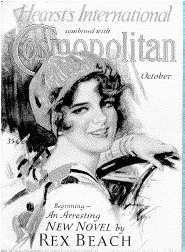
Solution of Mind Problems by the Imagination
by Jules Verne
No form of mental exercise is more entrancing than that of allowing
one's mind to run upon the possible outcome of inventions which while all
unfinished and impracticable now, may in some years come within the domain
of ordinary life.
The imagination is the greatest inventor in the world, for unlike the
scientist, it knows no bar to the completion and to the success of any
plan it has conceived. I have been called -- and I think wrongly called
-- the father of the submarine, the airship and the automobile. I did,
it is true, many years ago, describe these things as actually existent,
but my doing so was, you must understand, a tribute to the superiority
of the imagination as a solver of mental problems, rather than any tribute
to my own personal ingenuity or knowledge of science.
The first thing an inventor by imagination does, is to reflect upon
what has been accomplished on the special lines which he intends to traverse.
The imagination them comes to his assistance, and the inventor upon paper
reflects what his invention must be able to accomplish in order to fulfil
the purposes of his story.
It is easy, as the whole world knows, for a novelist to create men of
enormous wealth, and it is not much more difficult to solve problems of
locomotion, chemistry and physics by similar methods.
In solving mental problems by imagination, though, the careful writer
should remember one thing, and that thing is plausibility. He should study
carefully all that is known along the lines of the invention which he means
to perfect in his story, and he will then have every reason to anticipate
a plausible result which some day even may actually come true in real life,
as well as in a novel.
The writer of books of imagination in which problems of science and
mind problems generally find a solution, must, to be successful, be a voracious
reader, and take copious and voluminous notes of all he reads and all that
is likely to have a bearing upon the problems which he wants to solve.
In this way he acquires such scientific facts as will prevent the ordinary
reader from exclaiming against the wild impossibility of what the author
advances.
In my own case, I may say that in each of the hundred volumes I have
written there has been a definite scientific basis. It has been my object
to wrap a scientific fact in an imaginary covering, which, while inducing
minds of my youthful readers to exercise themselves with pleasure upon
the adventures in the story, shall also lead them to ponder on the scientific
kernel, and in this way perhaps bring about the ultimate invention of the
apparently impossible marvel which my book describes.
In one story for instance, a story which was called Topsy-Turvy in French
(I do not recollect the English title in the translation which was made),
the novel was based upon the events that would ensue on the displacement
of the earth's magnetic pole. Before writing my story, I had an exact calculation
made as to the size and other details of the cannon whose shock should
so displace the pole, and then purposely made the hero of my story commit
an error in the calculations which I caused him to make. Had he not done
so, I should have found it difficult to explain why France was not a lake
and why New York was not a mountain, or perhaps a glacier.
I am inclined to think that in the future the world will not have many
more novels in which mind problems will be solved by the imagination. It
may be the natural feeling of an old man with a hundred books behind him,
who feels that he has written out his subject, but I really feel as though
the writers of the present day and of past time who have allowed their
imaginations to play upon mind problems, have, to use a colloquialism,
nearly filled the bill.
The writer of my own day, or should I perhaps say, of my own afternoon,
who has done more in this way than any other man, is the young Englishman,
Mr. H. G. Wells, in whose works I have taken great interest since they
appeared in French translation. Nothing, for instance, can read more conclusively
than the extraordinary time-machine in one of Mr. Wells' books. I do not
think that such a machine as he describes will every be a real fact, of
course, and yet, as one reads the book, the author seems to have proved
conclusively that such an apparatus is absolutely within the bounds of
possibility. This is so because of the ingenious manner in which the author
has availed himself of such known scientific data as exist, and herein
lies the secret.
It does not do to dress up human beings in carnival attire, and call
them Martians, or Moon Men, and it is this mistake which Mr. Wells
so wonderfully and so successfully avoids. He invents his Moon Men and
his Martians, and he gives them attributes which actual science really
may permit them.
But put in a few words, the solution of mind problems by the imagination
consists of this -- a wish that some invention may be achieved, and then
the detailed description of its achievement as though it had actually taken
place. The wish is father to the thought, says the old proverb.
The solution of all problems of the mind undoubtedly may claim imagination
for its mother. |



